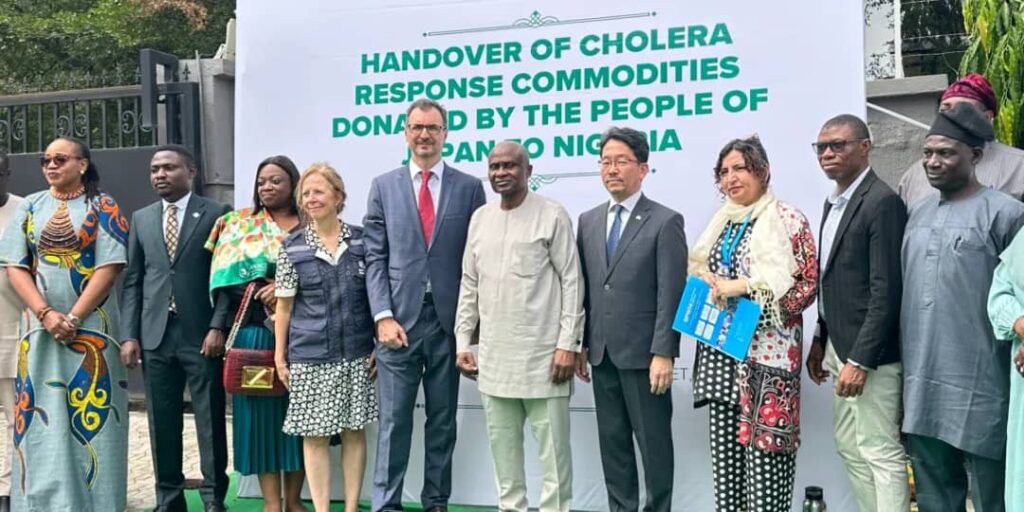Nigeria’s fight against persistent cholera outbreaks has received fresh international backing as the government of Japan, in partnership with the World Health Organisation, on Monday handed over $500,000 worth of emergency response commodities to the Nigeria Centre for Disease Control and Prevention (NCDC) in Abuja.
The donation, which includes treatment kits, medicines, surveillance tools, logistics support, and training materials, forms part of a broader intervention to strengthen Nigeria’s capacity to prevent, detect and respond swiftly to cholera outbreaks. WHO also delivered additional life-saving commodities valued at $104,951 to the agency.
Speaking at the ceremony, WHO Representative to Nigeria, Dr. Pavel Ursu, said the support came at a critical period when several communities still lack access to clean water and sanitation.
“This contribution is not just a shipment of supplies; it is a lifeline for communities at risk,”Dr. Ursu stated.
“The $500,000 Japan grant has catalysed interventions that improve the health of vulnerable Nigerians and reinforce national capacity to prevent and respond to public health emergencies.”
He explained that the donation includes a complete cholera kit (Central) split into 29 modules containing medicines, equipment and logistics items designed for use at different levels of the health system.
According to WHO data, Nigeria recorded 244 deaths and 10,353 suspected cases between January and September 2025, with states in the North-East and North-West most affected. All 36 states and the FCT have reported cases this year.
Japan’s Ambassador to Nigeria, Suzuki Hideo, said the donation was funded through Tokyo’s Supplementary Budget Project on Cholera Preparedness and Response.
“The goal is clear: detect cases early, contain their spread and protect the lives of those most at risk,” he said.
“Beyond the commodities, the project includes hands-on training to build stronger emergency response capacity.”
NCDC Director-General, Dr. Jide Idris, said the support aligns with ongoing efforts to “learn from past cholera seasons” and strengthen Nigeria’s surveillance and treatment systems.
“Cholera continues to threaten Nigeria due to inadequate access to safe water and sanitation, insecurity, population displacement, weak community surveillance and gaps in vaccine coverage,” Idris said.
He added that challenges such as rising antibiotic resistance further complicate response efforts.
Idris pledged transparent and accountable use of the donated resources, describing the intervention as “a moral imperative to protect vulnerable Nigerians.”
WHO Emergency Team Lead, Ann Fortin, said 134 local government areas have been classified as most at risk and will receive priority support.
She disclosed that all states and the FCT have already benefited from national cholera readiness training supported by Japan.
“So far, 29 of the 134 priority LGAs—and 11 additional LGAs—have received readiness interventions,” she noted.
“Community-based surveillance activities have also commenced in 18 LGAs across Kebbi and Sokoto states.”
Fortin said WHO, in partnership with the ministries of Health and Water Resources, NCDC and other stakeholders, will continue strengthening community surveillance, case management and public awareness campaigns, including messaging on preventing sexual exploitation and abuse during emergencies.
Do you want to share a story with us? Do you want to advertise with us? Do you need publicity for a product, service, or event? Contact us on WhatsApp +2348183319097 Email: platformtimes@gmail.com
We are committed to impactful investigative journalism for human interest and social justice. Your donation will help us tell more stories. Kindly donate any amount HERE




